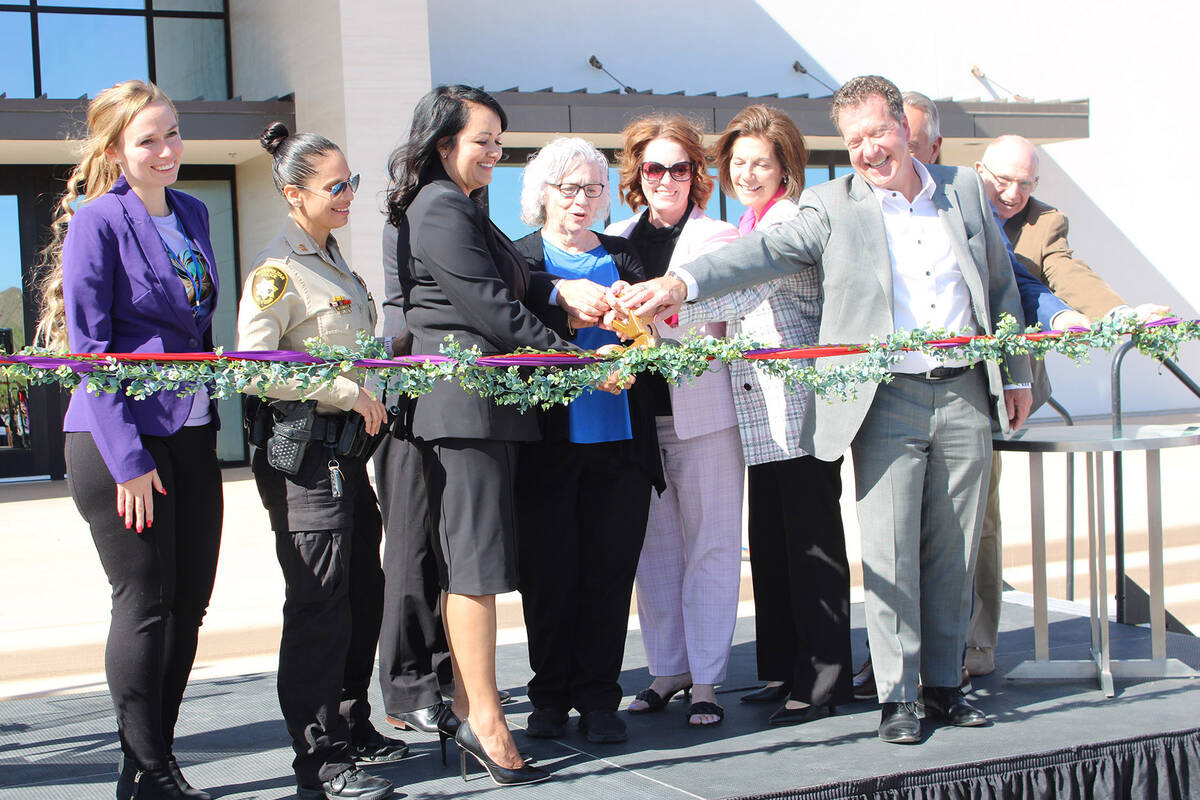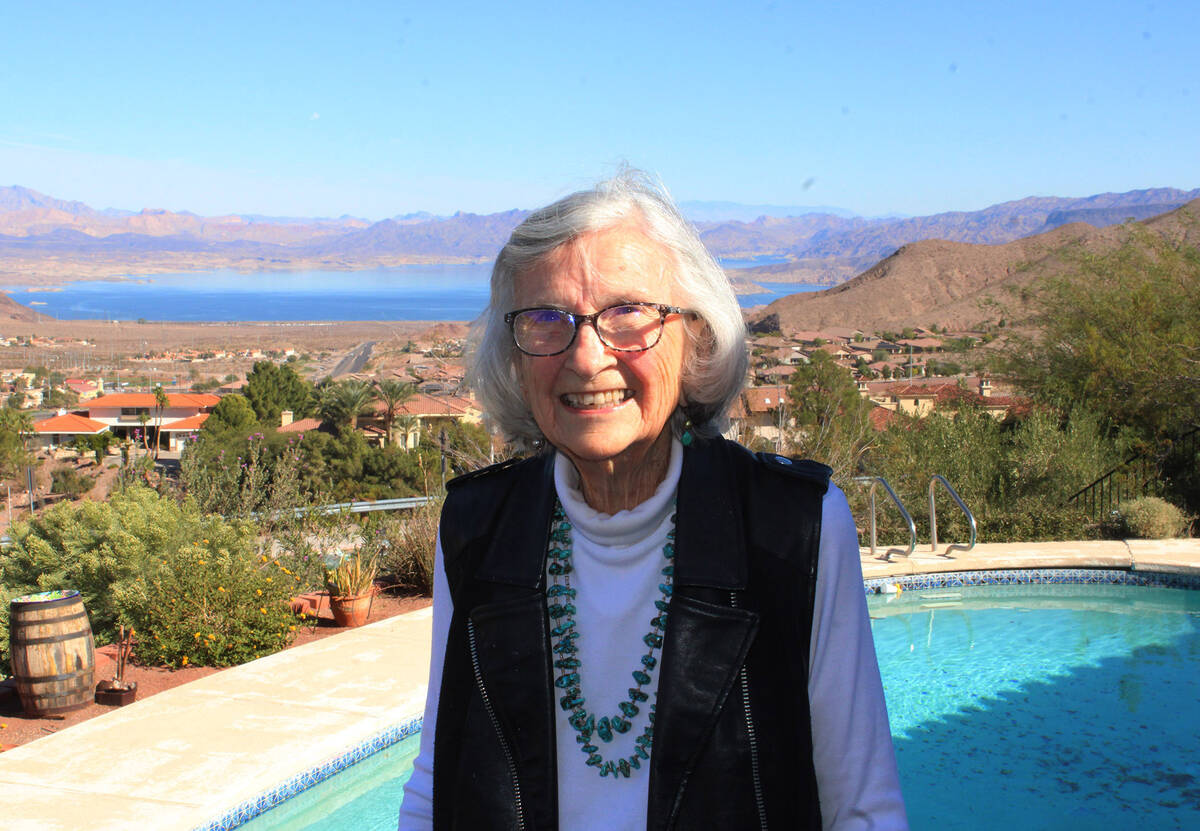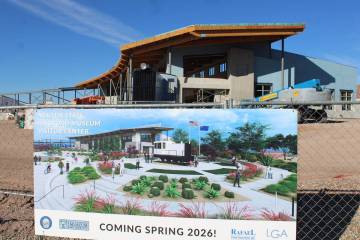Looking back at ’24 (some more)
Editor’s Note: This is the second half of looking back at 2024.
The second half of last year was maybe just as jam-packed as the first six months were. Let’s get right into it, shall we? (A rundown of the first six months of 2024 is available HERE.)
July
The second half of the year started with news that the two-story structure of the fire department’s new training tower hadw been completed. The structure is seen as a way to save the department and the city significant funds in overtime as firefighters will no longer have to travel to Henderson or North Las Vegas for training. The structure had been championed by former fire chief Will Gray.
What looked to be a quick and boring item on a city council agenda —a progress report from the consultant hired to put together a new five-year strategic plan for the city —instead turned into one of the most revealing exchanges of the year when the consultant touched the third rail of Boulder City politics —the Growth Ordinance. As inflation and housing costs continued to drive a national conversation that would come to a head in November, Robin Stiles of Emergent Method presented a slide that said, under the heading of Growth and Development, “Evaluate and when necessary modify or eliminate ordinances and local regulatory barriers to achieving diverse housing types and choices.” Stiles got an earful from Councilman Steve Walton, who said that kind of language did not belong in the strategic plan “whatsoever.” The language was removed from the final plan adopted later in the year.
The Healing Center at St. Jude’s Ranch for Children took a major step toward completion as the school portion of the project was finished. The residential units were finished and the facility was opened later in the year.
Discussions on how to find a new city manager (the sixth in just 12 years) erupted into one of the most contentious exchanges as the council initially split 3-2 in favor of declaring a critical labor shortage that would enable them to hire someone who was already collecting a a Public Employees Retirement System pension. Championed by Walton, the idea took advantage of a loophole in the state law allowing such hires that was originally put in place to help out rural areas having a hard time hiring teachers. Under the law, the council only had to declare that there was a shortage without providing any proof. Councilwoman Cokie Booth characterized that as “telling a fable,” which led to a heated exchange. Eventually Walton, in what he called an attempt to unify the council, changed his vote and the effort failed.
But it was not the only difficulty the city faced in replacing Taylour Tedder, who had departed in March. In June, the council had rejected a proposal from Raftelis, the same consulting firm that had worked with the city on a utility rate study and that had poached Tedder for the job he took in Delaware, instructed staff to try again.
Fallout from a decision in 2023 by a local couple who had developed a number of properties in the historic downtown area to sell all of their properties in order to devote more time to ailing family members continued to reverberate as the owners of the popular Boulder Dam Brewing Company announced that they had been unable to come to terms with the building’s new owner and would be closing after an 18-year run at that location. The closure was short-lived as an agreement was reached with the new owner just a few weeks later.
In a preview of perhaps the biggest issue of the year when looked at in terms of long-term impact, city staff organized a meeting for residents and concerned citizens to present a plan for removing unplayable turf at the Municipal Golf Course. The proposed removal was necessitated by a 2021 state law mandating that “non-functional” turf be removed from public and commercial properties (private homes are exempt) by January of 2027. The proposal was to remove about 30% of existing turf in the name of water conservation, but the nearly 100 people in attendance weren’t having it. Most attendees called for the city to remove no turf (which goes right up to the block walls of the property of many in attendance) and to instead replace the aging —and leaking —irrigation system. Advice from staff and a Southern Nevada Water Authority rep that the system replacement would help the water situation but not enough to put the city in compliance with SNWA water budgets, to say nothing of the requirements of state law were roundly dismissed. Multiple member of the city council, Sherri Jorgensen, Mayor Joe Hardy and Walton were all in attendance. All of them live in the general area of the golf course.
In a second shot over the bow in the space of as many weeks at the idea of affordable housing being a priority in Boulder City, the fate of a plot of land near the city’s cemetery appeared sealed when the Planning Commission denied a petition by the local Methodist church to build a multi-use project that would include both a worship space for the church as well as about 50 units of affordable senior housing. Residents protested the project saying it would lower property values and bring crime and traffic. Despite no proof of those claims, the commission voted 6-1 against the project and that denial was later upheld by the city council. The land is still vacant. Originally deeded to the church by the city for $195,000 in 2006, declining population and church attendance have left the church with no way to build a church without tying it to another development. The congregation continues to meet in the Smith Building.
August
With the last full month of summer came a return to school and a very big change for students at Garrett Junior High School and Boulder City High School as due to a Clark County School District rule, all cell phones had to be placed in pouches that block cell signals. The pouches do not lock and students are expected to put their phones in the pouches as soon as they enter a classroom. Administrators reported minimal pushback and said the new policy rolled out smoothly.
As solar energy production continues to grow in the Eldorado Valley, the question of how to store that energy so it can be used when the sun is not shining became more important. After approving plans for a facility that would see large batteries installed in the valley was approved earlier in the year, the council heard an innovative plan from a Canadian company that would see water flowing between a surface reservoir and an underground cavern to create the same kind of hydroelectric power source as seen in Hoover Dam. As the year came to an end, it is still only a proposal.
After it appeared just weeks before that, multiple members of the city council were open to revisiting the city ban on off-highway vehicles on city streets, it appeared that a vocal subset of BC residents swayed that. With both Walton and Jorgensen noting a few weeks prior that the 2019 ballot question on the issue had been poorly worded and difficult to understand, when the issue came back for a vote, both changed their tune and appeared to side with residents who said the issue had already been decided. Ultimately, the council made a totally non-binding decision to put the issue back before voters. It is not binding because the makeup of the council will have changed by that time and one council cannot limit the decisions of a future short of an ordinance being passed.
The contentious golf course turf issue came to a head with the council basically telling the SNWA to pound a sandtrap and approving a plan for minimal turf reduction that is projected to use 20% more water than allowed for under the SNWA water budget. This will make Boulder City the only jurisdiction in Southern Nevada that has refused to comply with the reduced water usage limits, opting instead to pay a fine. Because the city owns both the golf course and the water utility, they are basically paying the fine to themselves.
Pet issues continued to dominate as the month saw both a social media poll put up by the Review showing that residents favored a tougher leash law by a ratio of 10-1 and the saga of Seven began. The 10-week old puppy was beaten nearly to death in Mohave County, Ariz. and transported to Boulder City where a resident on 7th Street claimed to have found him in the alley behind her home. The puppy lost an eye and several teeth in the beating. The city and PD issued a press release stating that the beating took place in Arizona and to contact Mohave County for more information. Despite providing the name of a suspect (provided to the Review by a confidential tip), Mohave County law enforcement would provide no info on the case and, to date, it does not appear that an arrest has been made.
In sports, the BCHS football team saw hopes of a championship season dimmed in the very first game as star quarterback Gage Hopkinson came off the field in the first quarter of a 43-0 route of Valley with a broken collarbone.
September
In a town with double the state average of residents over age 60 and just half the average of residents under the age of 18, school enrollment is bound to be challenging. This was the case in 2024 as it came out that 30% of students at BCHS do not live in Boulder City. Without choice of school, the high school’s enrollment would be just 439, making it even smaller than longtime rival Moapa Valley High School by more than 100.
Enrollment issues were also present at Martha P. King Elementary School as administrators were faced with a more than $226,000 deficit after enrollment projections came up short by 28 students for the new school year or more than 7% of pre-school year estimates. The shortfall resulted in the elimination of a handful of budgeted positions at the school.
At the city government level, a pandemic-era accommodation (the reading of written public comments into the official record) came to an end. Residents can submit written comments, which will be included in the packets received by the council or the can call in or come to meetings if they wish to be heard.
And the loss of the expansive lawn in front of the Bureau of Reclamation building will not be the only big change to the “top” of BC as the council voted unanimously to allow the building of a memorial to fallen BC veteran Shane Patton to be placed in Wilbur Square, the park that sits between City Hall and the BoR. The final vote came despite expressed misgivings on the part of Hardy and Walton over placement (they preferred to see the memorial put in Veterans Memorial Park) after a last-minute plea from the mayor for unanimity.
October
Pet issues continued to dominate as Q3 of 2024 began. After initially insisting that the city could not address the desire for a fancier permit without also legislating a permit process for pet breeding, the city did exactly that back in June and tabled the breeding idea through the summer. But as fall began, a notice went out that the city was seeking feedback for the creation of a Business Impact Statement. State law requires the city to issue such a statement anytime a law goes into effect that includes fines or fees. The notice told interested parties to send their input to Animal Control Supervisor Ann Inabnitt.
The problem was that no one had told Inabnitt in advance and the fierce critic of backyard breeding went on the warpath. In a letter to every city council member (a letter that was leaked by one of the recipients to the Review) as well as the command team at BCPD and senior city staff that combined accusations of dishonesty on the part of the city attorney, attempted manipulation of the process by Councilman Walton along with an announcement that Inabnitt would retire earlier than expected at the end of the year.
Following that announcement, the Review queried the city pointing out that state law regarding breeding could be read in two ways. One way was that cities had to allow breeding via permit and the other way that if a city allowed breeding a permit had to be involved. The question was if anyone had sought clarification from the state about the intent of the law. The statement in response said that the city attorney was confident in her reading of the law but that she had opted to seek a formal opinion from the attorney general before moving forward.
A petition to the attorney general put out by concerned residents has garnered more than 600 signatures and there has been no word from the state so far as to when an opinion on the intent of the law will be issued, leaving the local matter in limbo as the year came to an end.
The denied plan for the Methodist church to build a facility that combines affordable senior housing with a worship center continued to bubble up as the church hosted an information-only session for residents putting forth a new plan with a higher age limit (62 versus 55) as well as a different location next to the already age-restricted Gingerwood mobile home park.
Sometimes a single word can make a big difference which was the case as the city council voted to accept a staff recommendation that will mean that electricity rates can only go up and never go down without a change to city code. Citing a need to pay for infrastructure improvements, the word “adjusted” was changed to “increased.” So, if costs for procuring power go up, rates go up. If costs for power go down, rates stay the same.
November
Election season finally came to an end as Denise Ashurst bested Matt Fox in a runoff for the final city council seat. After coming up just short of avoiding a runoff in the summer, Ashurst topped Fox this time by a margin of almost 2-1. The ballot question seeking an additional up to $9 million dollars to construct a new city aquatics complex won with a similar margin.
During that same week, the long-awaited Healing Center at St. Jude’s Ranch for Children finally opened with a ceremony that brought state and national political dignitaries to town. The dignitary train kept chugging the following week as Governor Joe Lombardo spoke at a Veterans Day ceremony at the Southern Nevada State Veterans Home.
The Veterans Home itself stayed in the news as well with the announcement that, after having lost their vaunted five-star federal rating earlier in the year, the home had its fifth star restored.
In a reversal from his prior statements on the subject that seemed to surprise his colleagues, Councilman Steve Walton provided the tipping point vote directing city staff to bring back language to the council to tighten up the city’s notoriously lax leash law. While the law has not changed yet and a single vote change could tip the scales again, if the council approves new language expected in early 2025, residents would no longer be able to have their dogs off-leash in public areas simply by claiming that are under “voice control.” The 3-2 vote came just weeks after Mayor Joe Hardy and his wife had a run-in with an off-leash dog in a city park with Matt Fox (in his final council meeting) and Cokie Booth dissenting.
After a headhunter brought the city three possible candidates to fill the open position of city manager, council met with and publicly interviewed two. All of the candidates were or had most recently worked in California and the council had expressed a strong desire for a candidate from Nevada, which had been what sparked discussion of declaring a critical labor shortage in order to bring in a Nevada retiree. But one of the candidates, Ned Thomas, while currently serving as city manager in Milpitas, Calif. actually has called Southern Nevada home for decades and currently owns a residence in Henderson. Following the interviews, Thomas got the nod and a conditional job offer at a $200,000 annual salary. At the time of this writing, the formal background check process and any negotiation over pay and benefits were still ongoing.
^
December
As Boulder City switched into all-holiday-all-the-time mode, sad news came as Milo Hurst, a leading light in the initial revitalization of the historic downtown area nearly 30 years ago died. Milo’s Bistro, originally opened as Milo’s Cellar and Inn had announced some weeks earlier that the business would be closing permanently.
City government officially got a new face added as Denise Ashurst was sworn in and took her place on the dais in the city council’s final meeting of 2024. Christopher Tilman was also sworn in as justice of the peace for the Boulder Township (a county position) after winning the election in June. However, in a potential break from longstanding city tradition of naming the same person who is elected as justice to the appointed position as municipal judge, the council opted to seek advice from other municipalities on a selection process for a new judge. This desire for input will be complicated by the fact that Boulder City is one of just two jurisdictions in the state where the judge is not either elected or automatically given the office as a result of being elected as justice of the peace for the county or township. Instead of naming Tilman to the office, the council voted to make retiring judge Victor Miller a senior judge, where he will continue to oversee the municipal court until a successor is named.
The outcry over the removal of turf at the Bureau of Reclamation building took another turn as dozens of residents turned out at a meeting of the Historic Preservation Committee meeting to express their displeasure to a BoR rep who was actually there to talk about signage. Christopher MacMahon (who also runs the Railroad Museum) told residents that the land belongs to the federal government and that there is nothing any city entity can do to change the project as it lacks jurisdiction over federal property. Despite that, following the meeting, Ashurst (a former member of the committee before being elected to council) put her name to a letter where she said she was speaking as a private citizen and not a member of the council urging the BoR to come to the table and craft a new plan acceptable to city residents.
In a final bit of good news for the city and the tourism that drives it, the Nevada State Railroad Museum broke ground on a long-awaited indoor facility. Slated to begin construction in the spring, the new structure will add 2,800 square feet of indoor exhibit space to a facility that has always been an outdoor-only experience.




















